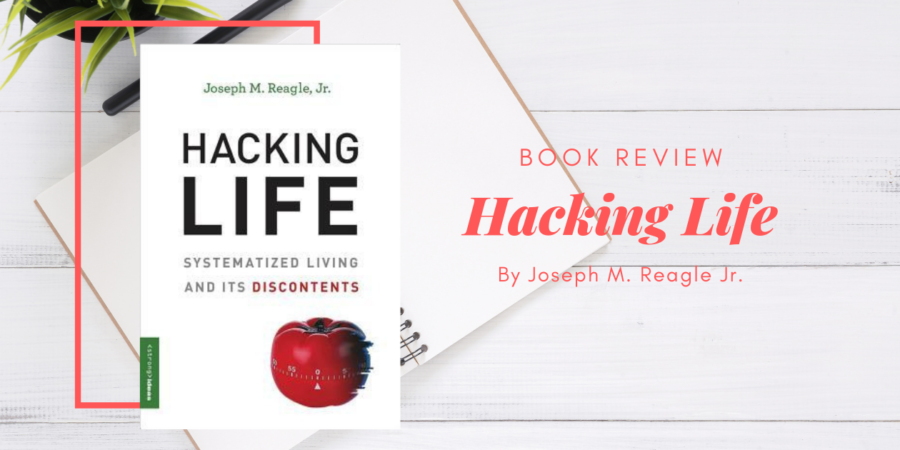This was one of the new ebooks in the NLB and the title sounded pretty cool. Hacking Life is not a manual or tips on life hacking. Instead, it’s a critique of the life hacking movement as a whole. I’ve heard bits and pieces about life hacking – I’ve heard of people tracking their entire lives (the Quantified Self) and I’ve read The Four Hour Work Week aeons ago in school – but I’ve never actually delved deep into the topic.
Hacking Life looks at the life-hacking movement from several aspects: the people themselves, hacking time, hacking motivation, minimalism, hacking health, hacking relationships (which turned out to be about Pick Up Artists/PUA), as well as the motivations behind the life-hacking movement.
But first, a definition. Life hacking is defined as a subgenre of self-help, and can be distilled as “a continuation of American self-help for geeks.” What makes life hackers stand out from other self-help adherents is their emphasis on optimising systems to optimise life. Hackers, Reagle writes, “are drawn to exploring, building, and manipulating systems.” Apart from who hackers are, another thing to keep in mind is the hacker ethos, defined as “an individualistic and rational approach of systemization and experimentation.”
I found this to be pretty interesting. Reagle makes it clear from the start that he’s not going to condemn the whole idea of life-hacking, but he’s not going to be uncritically praising it either. That made it pretty balanced, in my opinion, and I ended up learning a lot. Some things that gave me food for thought:
- “Although life hacking practices could make one a more effective advocate for social improvement, life hacking’s focus is on hacking, above all, the self.” – There’s a lot to unpack here, but this line from the beginning of the book connects with the end, which looks at the fact that when life hackers look at health, they spend a lot of time testing on themselves. Every individual is indeed unique, but to test on a subject pool of one and then to recommend whatever you think ‘works’ may not be the best idea. Reagle points out that this method doesn’t take into account a lot of variables as well.
- Life hacking can turn on itself – you spend so much time tweaking your systems that the amount of time or labour saved is less than the amount of time or labour spent optimising the system. It reminded me of the 80/20 rule – 80% of the effect comes from 20% of the effort. Knowing when to stop optimising a life hack, then, is something that is essential to making sure your life hack actually benefits you and doesn’t turn into an endless cycle of improvements with no effects.
- Sadly, life hacking is still quite gendered. Many of the hackers are male and the apps they produced do not fully consider women. E.g. Apple’s health app, which tracks lots of things but not periods. There are women hackers and other marginalised hackers (the book makes a point that they have an equally long history of hacking) but because of the male-dominated life hacking scene, the tools that come out end up perpetuating the cycle where it’s easier for men to get into life-hacking then women.
- On a similar note, Reagle notes that life-hacking doesn’t have the same stigma as ‘self-help’. It seems to be another gender issue – men are associated with life-hacking, while women are associated with self-help (even though data from 2017 found that men write more self-help books than women).
- The section on hacking relationships was basically PUA and it just made me sad.
Most of the things I found interesting were about criticisms about life-hacking, but there are benefits. If you’re part of the creative class (which includes tech) and if you have enough autonomy about your hours, you can use life-hacking to optimise your life. But you have to be careful about the hacking you use, the same way you should be careful about adopting a new app or another piece of technology. Blindly implementing life hacks may not be a good idea. Beyond that, the focus on self means that social norms are seen as things to be subverted – as someone who lives in a less individualistic society, I can imagine how this can lead to chaos. The pursuit of individual benefit above all is not always the best method.
As someone who was only vaguely familiar with the life-hacking movement, I found Hacking Life to be very interesting. It introduces the concept, history, and various aspects of life-hacking while being pretty fair in its appraisal. If you’re interested in this section of the internet, I think this is a book that will interest you.

I have heard of life hacking, but mostly in the abstract. This sounds like a very good and balanced look at the movement. I am glad you got so much out of it, Eustacia.
Thanks for the comment, Wendy. I only knew about life hacking in the abstract as well so this was fascinating